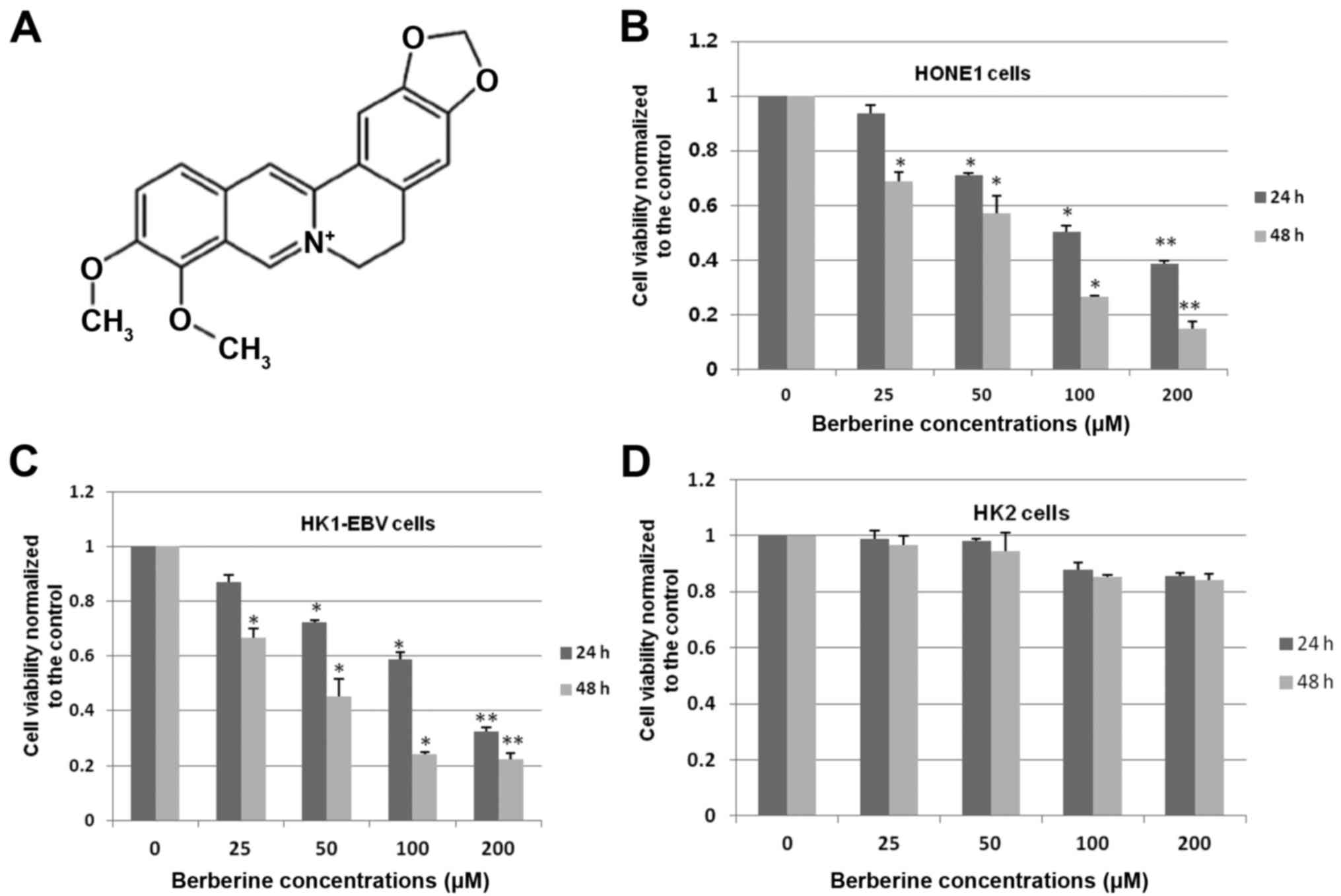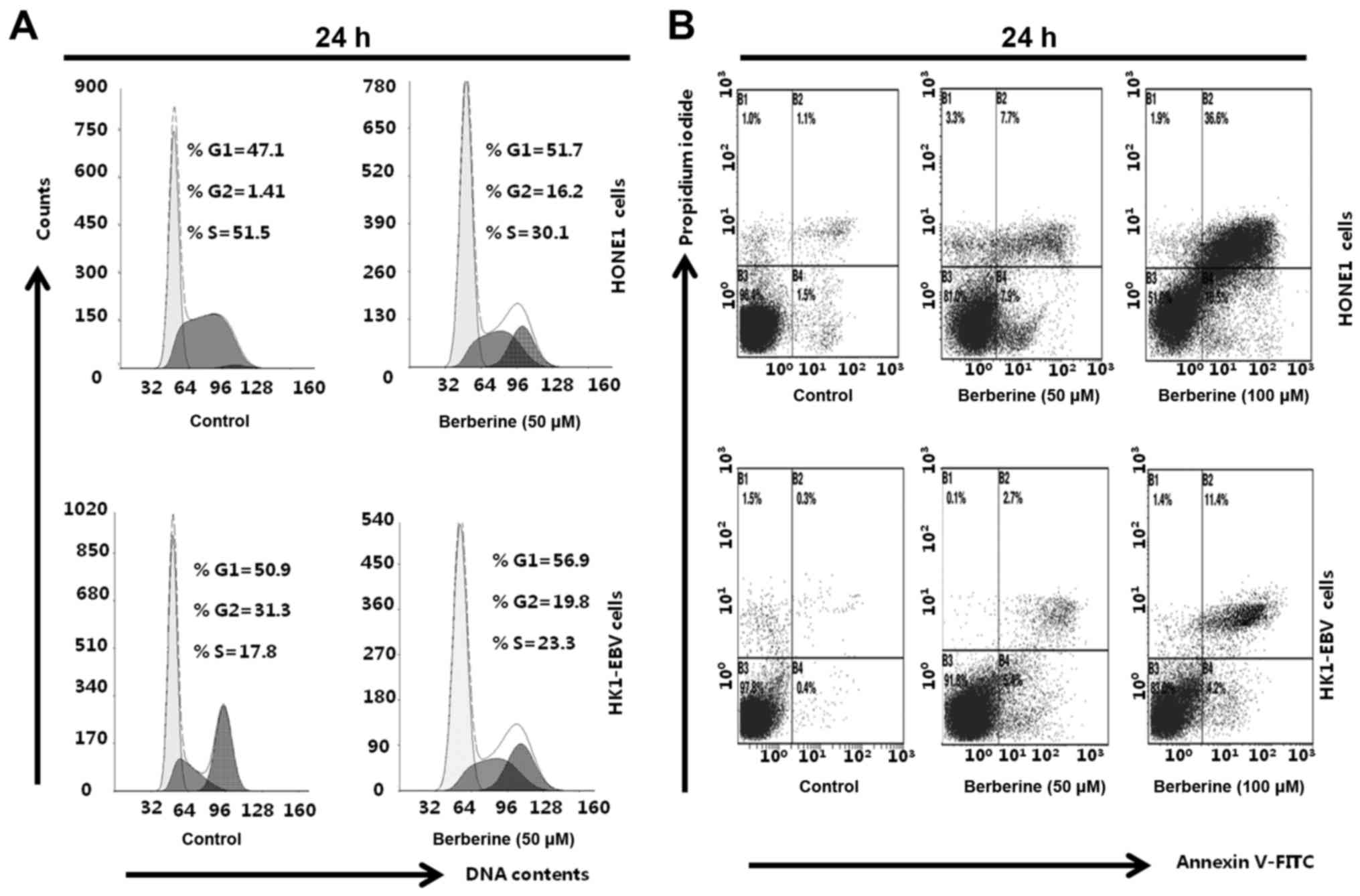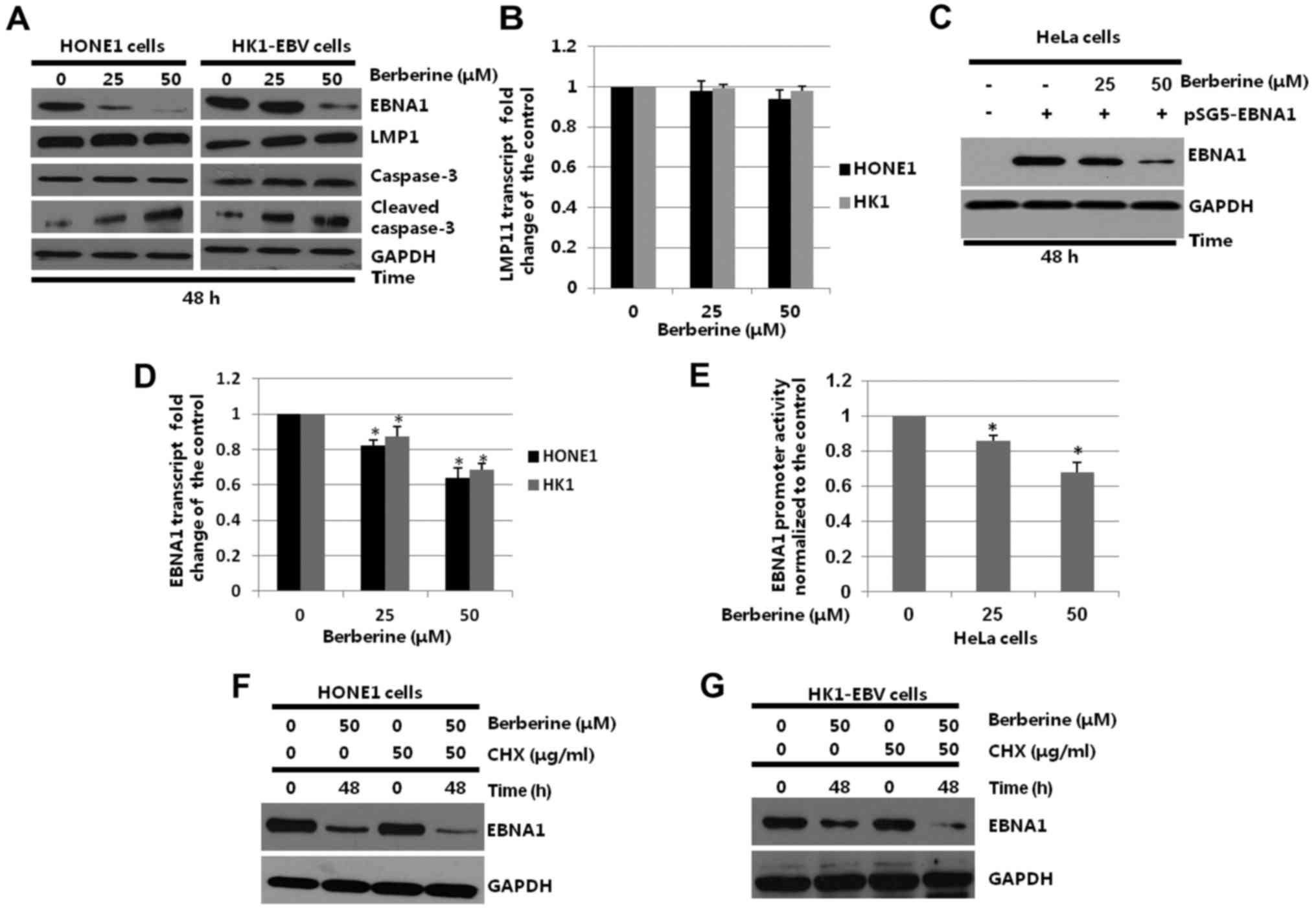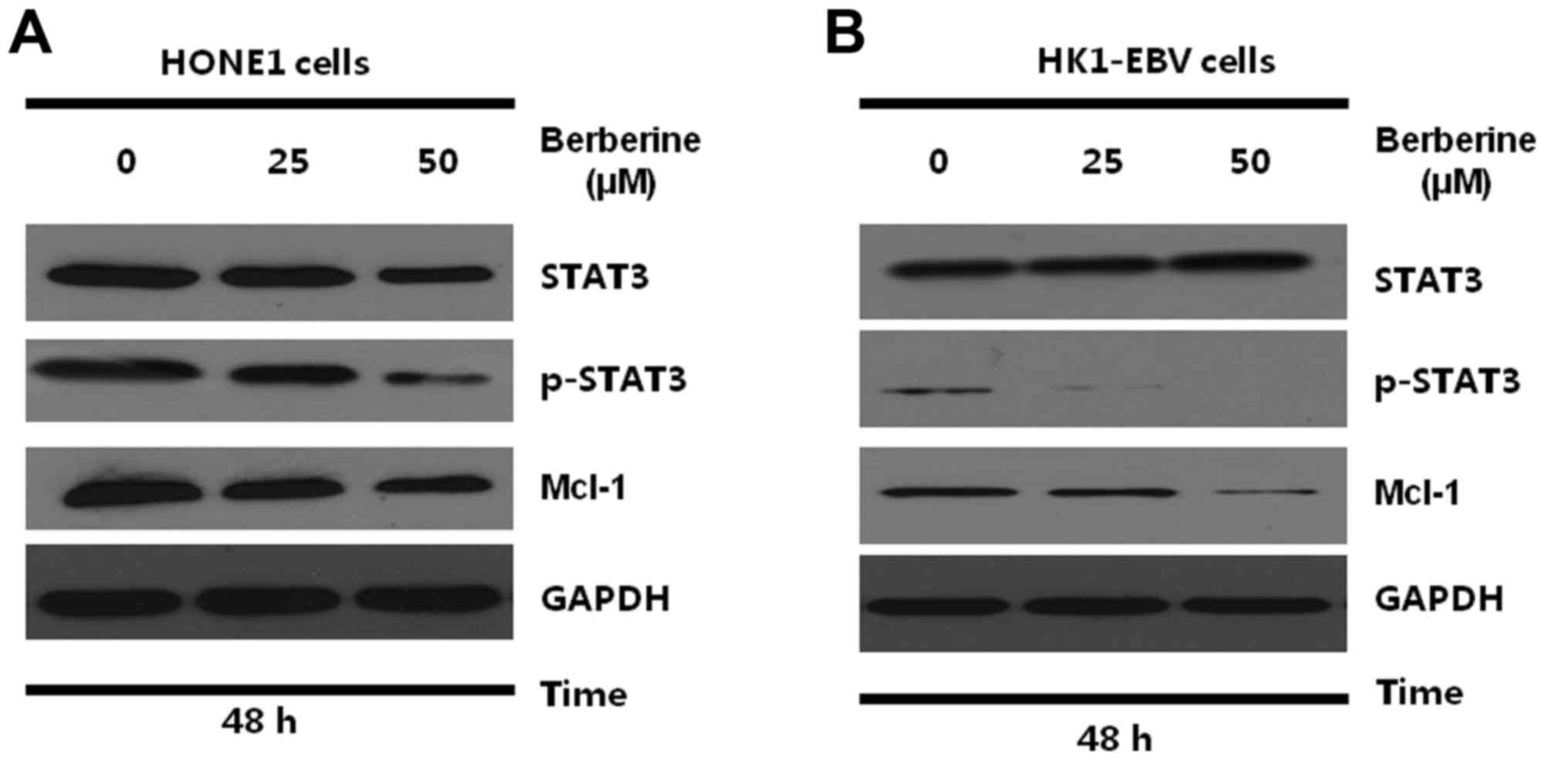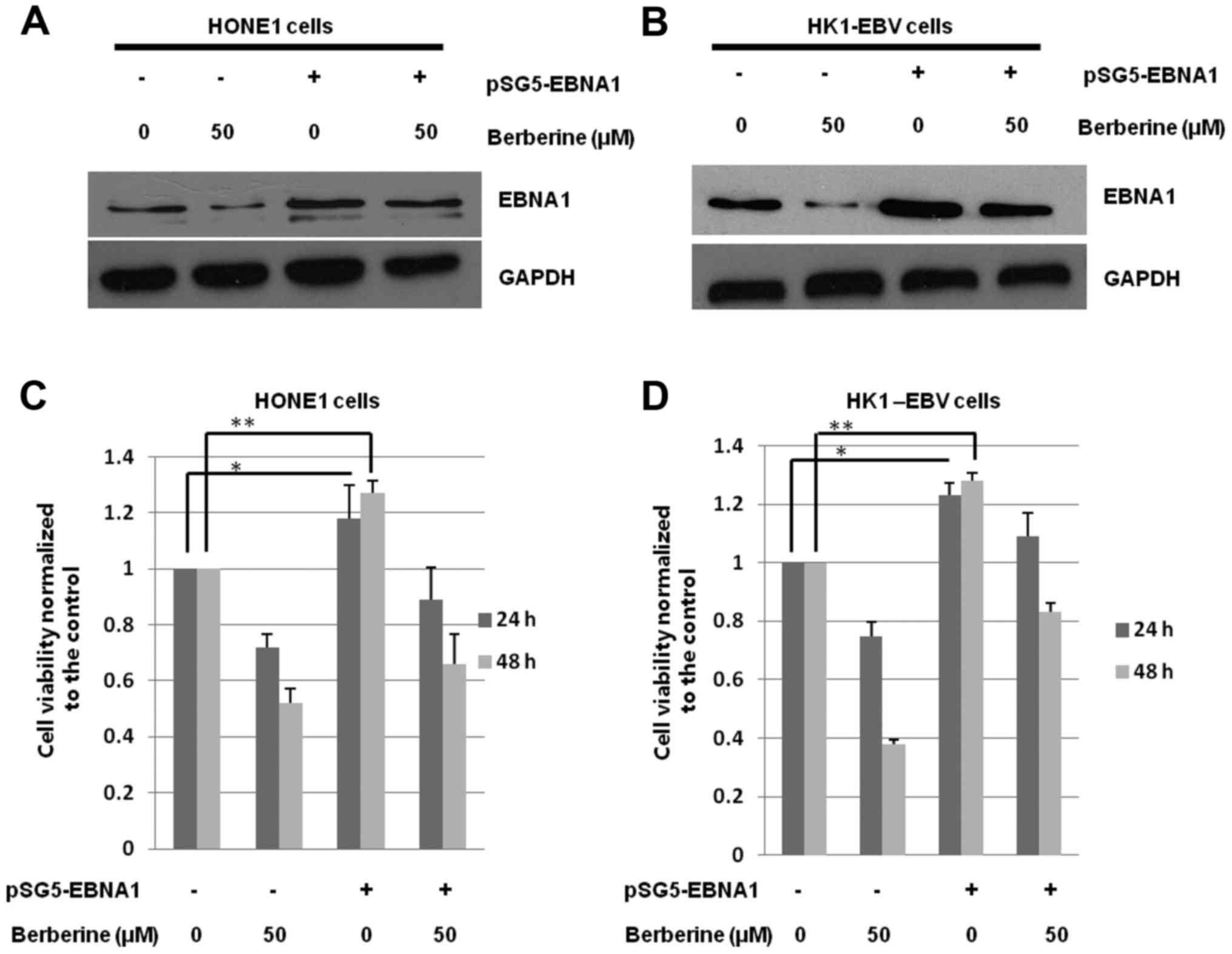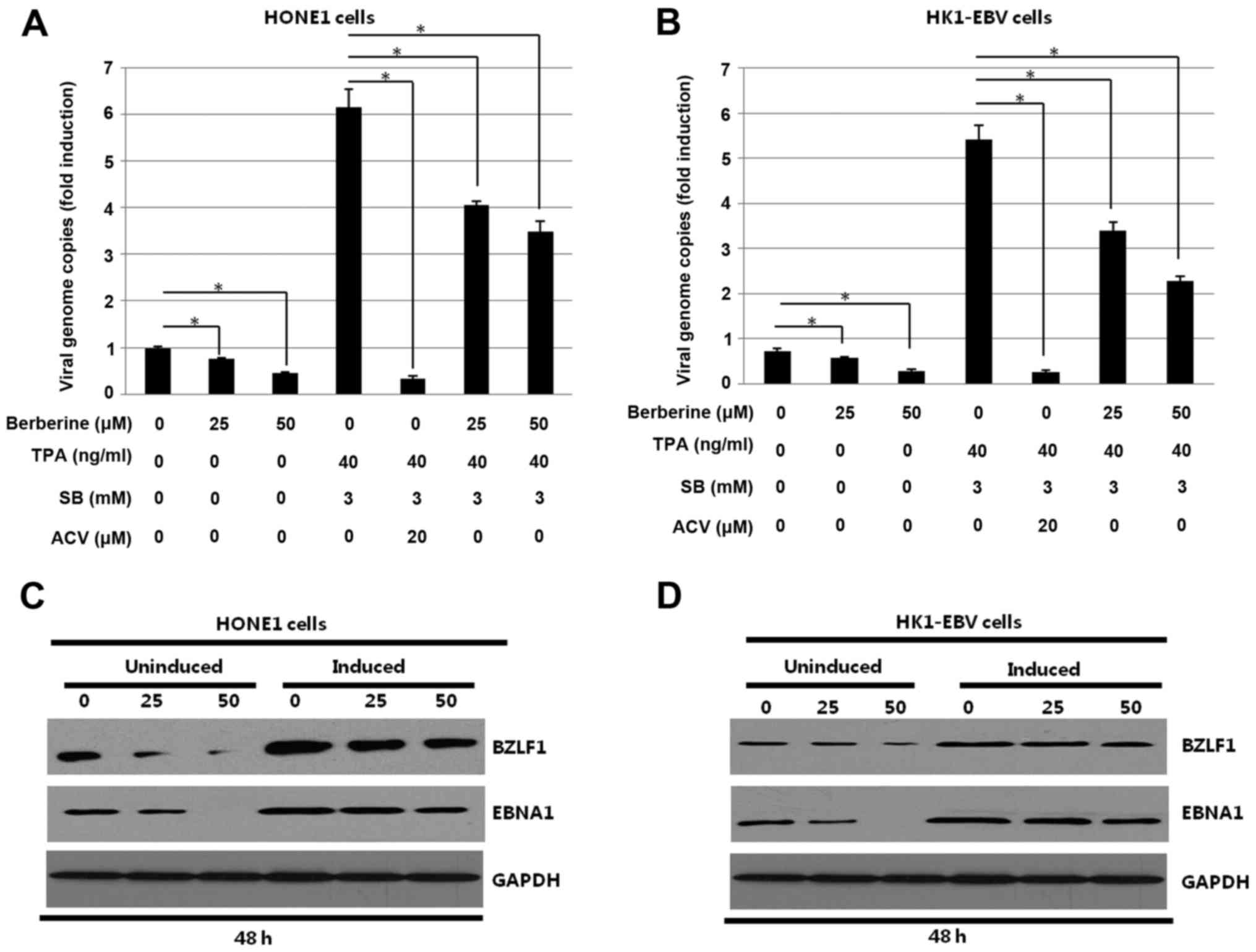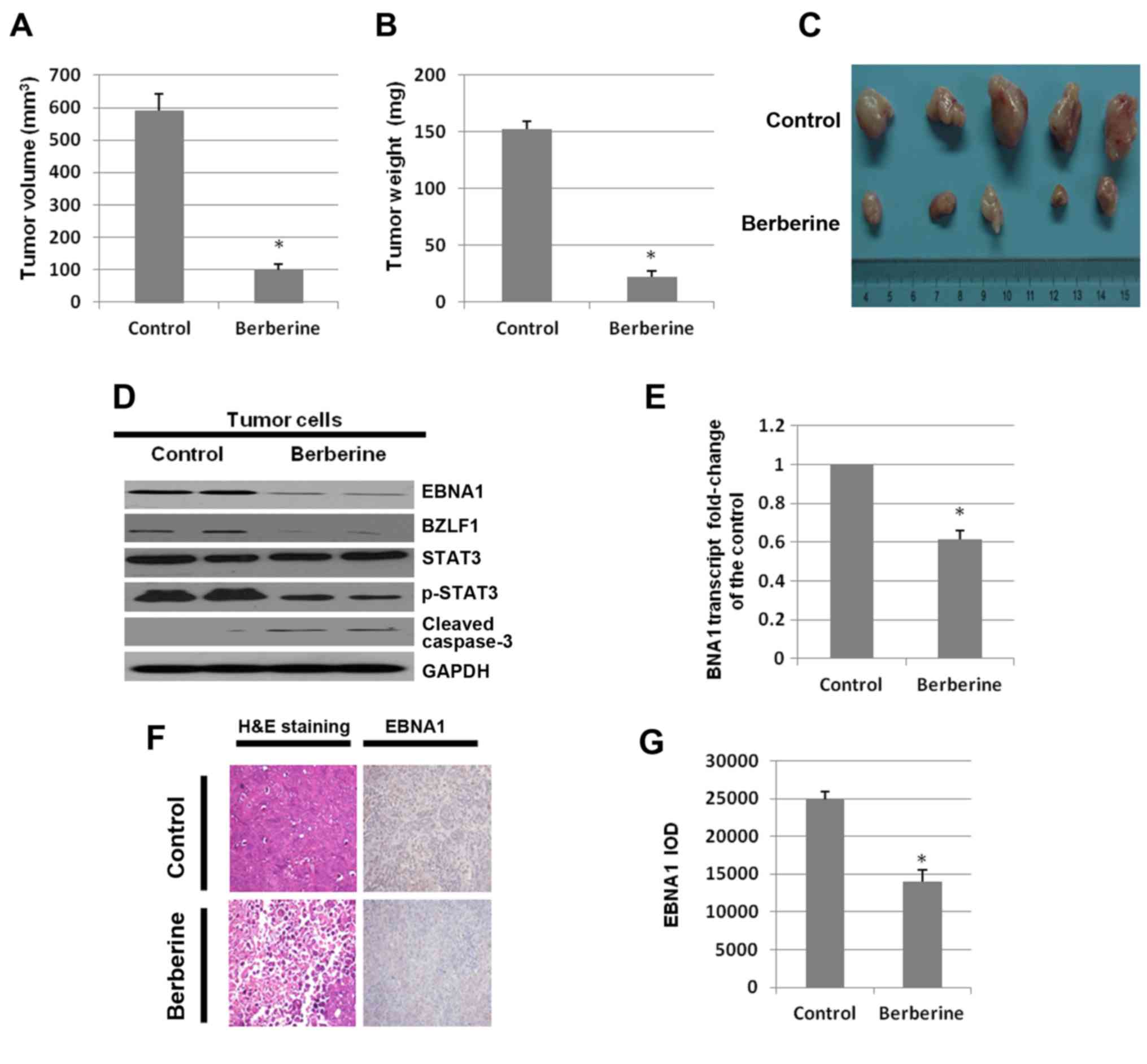|
1
|
Martin KA, Lupey LN and Tempera I:
Epstein-Barr virus oncoprotein LMP1 mediates epigenetic changes in
host gene expression through PARP1. J Virol. 90:8520–8530. 2016.
View Article : Google Scholar : PubMed/NCBI
|
|
2
|
Cui Q, Feng FT, Xu M, Liu WS, Yao YY, Xie
SH, Li XZ, Ye ZL, Feng QS, Chen LZ, et al: Nasopharyngeal carcinoma
risk prediction via salivary detection of host and Epstein-Barr
virus genetic variants. Oncotarget. 2016.
|
|
3
|
Xu M, Cheung CC, Chow C, Lun SW, Cheung ST
and Lo KW: Overexpression of PIN1 enhances cancer growth and
aggressiveness with cyclin D1 induction in EBV-associated
nasopharyngeal carcinoma. PLoS One. 11:e01568332016. View Article : Google Scholar : PubMed/NCBI
|
|
4
|
Sivachandran N, Thawe NN and Frappier L:
Epstein-Barr virus nuclear antigen 1 replication and segregation
functions in nasopharyngeal carcinoma cell lines. J Virol.
85:10425–10430. 2011. View Article : Google Scholar : PubMed/NCBI
|
|
5
|
Mansouri S, Pan Q, Blencowe BJ, Claycomb
JM and Frappier L: Epstein-Barr virus EBNA1 protein regulates viral
latency through effects on let-7 microRNA and dicer. J Virol.
88:11166–11177. 2014. View Article : Google Scholar : PubMed/NCBI
|
|
6
|
Houldcroft CJ and Kellam P: Host genetics
of Epstein-Barr virus infection, latency and disease. Rev Med
Virol. 25:71–84. 2015. View
Article : Google Scholar : PubMed/NCBI
|
|
7
|
Zhu DD, Zhang J, Deng W, Yip YL, Lung HL,
Tsang CM, Law WT, Yang J, Lau VM, Shuen WH, et al: Significance of
NF-κB activation in immortalization of nasopharyngeal epithelial
cells. Int J Cancer. 138:1175–1185. 2016. View Article : Google Scholar : PubMed/NCBI
|
|
8
|
Wang FW, Wu XR, Liu WJ, Liang YJ, Huang
YF, Liao YJ, Shao CK, Zong YS, Mai SJ and Xie D: The nucleotide
polymorphisms within the Epstein-Barr virus C and Q promoters from
nasopharyngeal carcinoma affect transcriptional activity in vitro.
Eur Arch Otorhinolaryngol. 269:931–938. 2012. View Article : Google Scholar : PubMed/NCBI
|
|
9
|
Shen Y, Zhang S, Sun R, Wu T and Qian J:
Understanding the interplay between host immunity and Epstein-Barr
virus in NPC patients. Emerg Microbes Infect. 4:e202015. View Article : Google Scholar : PubMed/NCBI
|
|
10
|
Sam CK, Brooks LA, Niedobitek G, Young LS,
Prasad U and Rickinson AB: Analysis of Epstein-Barr virus infection
in nasopharyngeal biopsies from a group at high risk of
nasopharyngeal carcinoma. Int J Cancer. 53:957–962. 1993.
View Article : Google Scholar : PubMed/NCBI
|
|
11
|
Kelly GL, Stylianou J, Rasaiyaah J, Wei W,
Thomas W, Croom-Carter D, Kohler C, Spang R, Woodman C, Kellam P,
et al: Different patterns of Epstein-Barr virus latency in endemic
Burkitt lymphoma (BL) lead to distinct variants within the
BL-associated gene expression signature. J Virol. 87:2882–2894.
2013. View Article : Google Scholar : PubMed/NCBI
|
|
12
|
Kempkes B and Ling PD: EBNA2 and its
coactivator EBNA-LP. Curr Top Microbiol Immunol. 391:35–59.
2015.PubMed/NCBI
|
|
13
|
Frappier L: Contributions of Epstein-Barr
nuclear antigen 1 (EBNA1) to cell immortalization and survival.
Viruses. 4:1537–1547. 2012. View
Article : Google Scholar : PubMed/NCBI
|
|
14
|
Dheekollu J, Wiedmer A, Sentana-Lledo D,
Cassel J, Messick T and Lieberman PM: HCF1 and OCT2 cooperate with
EBNA1 to enhance OriP-dependent transcription and episome
maintenance of latent Epstein-Barr virus. J Virol. 90:5353–5367.
2016. View Article : Google Scholar : PubMed/NCBI
|
|
15
|
Wood VH, O'Neil JD, Wei W, Stewart SE,
Dawson CW and Young LS: Epstein-Barr virus-encoded EBNA1 regulates
cellular gene transcription and modulates the STAT1 and TGFβ
signaling pathways. Oncogene. 26:4135–4147. 2007. View Article : Google Scholar : PubMed/NCBI
|
|
16
|
Valentine R, Dawson CW, Hu C, Shah KM,
Owen TJ, Date KL, Maia SP, Shao J, Arrand JR, Young LS, et al:
Epstein-Barr virus-encoded EBNA1 inhibits the canonical NF-kappaB
pathway in carcinoma cells by inhibiting IKK phosphorylation. Mol
Cancer. 9:12010. View Article : Google Scholar : PubMed/NCBI
|
|
17
|
Tempera I, De Leo A, Kossenkov AV,
Cesaroni M, Song H, Dawany N, Showe L, Lu F, Wikramasinghe P and
Lieberman PM: Identification of MEF2B, EBF1, and
IL6R as direct gene targets of Epstein-Barr virus (EBV)
nuclear antigen 1 critical for EBV-infected B-lymphocyte survival.
J Virol. 90:345–355. 2015. View Article : Google Scholar : PubMed/NCBI
|
|
18
|
Holowaty MN, Sheng Y, Nguyen T, Arrowsmith
C and Frappier L: Protein interaction domains of the
ubiquitin-specific protease, USP7/HAUSP. J Biol Chem.
278:47753–47761. 2003. View Article : Google Scholar : PubMed/NCBI
|
|
19
|
Saridakis V, Sheng Y, Sarkari F, Holowaty
MN, Shire K, Nguyen T, Zhang RG, Liao J, Lee W, Edwards AM, et al:
Structure of the p53 binding domain of HAUSP/USP7 bound to
Epstein-Barr nuclear antigen 1 implications for EBV-mediated
immortalization. Mol Cell. 18:25–36. 2005. View Article : Google Scholar : PubMed/NCBI
|
|
20
|
Wang FW, Wu XR, Liu WJ, Liao YJ, Lin S,
Zong YS, Zeng MS, Zeng YX, Mai SJ and Xie D: Heat shock factor 1
upregulates transcription of Epstein-Barr Virus nuclear antigen 1
by binding to a heat shock element within the BamHI-Q
promoter. Virology. 421:184–191. 2011. View Article : Google Scholar : PubMed/NCBI
|
|
21
|
Brooks L, Yao QY, Rickinson AB and Young
LS: Epstein-Barr virus latent gene transcription in nasopharyngeal
carcinoma cells: Coexpression of EBNA1, LMP1, and LMP2 transcripts.
J Virol. 66:2689–2697. 1992.PubMed/NCBI
|
|
22
|
Chen H, Lee JM, Zong Y, Borowitz M, Ng MH,
Ambinder RF and Hayward SD: Linkage between STAT regulation and
Epstein-Barr virus gene expression in tumors. J Virol.
75:2929–2937. 2001. View Article : Google Scholar : PubMed/NCBI
|
|
23
|
Chen H, Lee JM, Wang Y, Huang DP, Ambinder
RF and Hayward SD: The Epstein-Barr virus latency BamHI-Q
promoter is positively regulated by STATs and Zta interference with
JAK/STAT activation leads to loss of BamHI-Q promoter
activity. Proc Natl Acad Sci USA. 96:9339–9344. 1999. View Article : Google Scholar : PubMed/NCBI
|
|
24
|
Yu H and Jove R: The STATs of cancer - new
molecular targets come of age. Nat Rev Cancer. 4:97–105. 2004.
View Article : Google Scholar : PubMed/NCBI
|
|
25
|
Imai S, Kuroda M, Yamashita R and Ishiura
Y: Therapeutic inhibition of Epstein-Barr virus-associated tumor
cell growth by dominant-negative EBNA1. Uirusu. 55:239–249.
2005.(In Chinese). View Article : Google Scholar : PubMed/NCBI
|
|
26
|
Coppotelli G, Mughal N, Callegari S,
Sompallae R, Caja L, Luijsterburg MS, Dantuma NP, Moustakas A and
Masucci MG: The Epstein-Barr virus nuclear antigen-1 reprograms
transcription by mimicry of high mobility group A proteins. Nucleic
Acids Res. 41:2950–2962. 2013. View Article : Google Scholar : PubMed/NCBI
|
|
27
|
Goto H, Kariya R, Shimamoto M, Kudo E,
Taura M, Katano H and Okada S: Antitumor effect of berberine
against primary effusion lymphoma via inhibition of NF-κB pathway.
Cancer Sci. 103:775–781. 2012. View Article : Google Scholar : PubMed/NCBI
|
|
28
|
Lin JP, Yang JS, Lee JH, Hsieh WT and
Chung JG: Berberine induces cell cycle arrest and apoptosis in
human gastric carcinoma SNU-5 cell line. World J Gastroenterol.
12:21–28. 2006. View Article : Google Scholar : PubMed/NCBI
|
|
29
|
Peng PL, Hsieh YS, Wang CJ, Hsu JL and
Chou FP: Inhibitory effect of berberine on the invasion of human
lung cancer cells via decreased productions of
urokinase-plasminogen activator and matrix metalloproteinase-2.
Toxicol Appl Pharmacol. 214:8–15. 2006. View Article : Google Scholar : PubMed/NCBI
|
|
30
|
Kim JB, Yu JH, Ko E, Lee KW, Song AK, Park
SY, Shin I, Han W and Noh DY: The alkaloid Berberine inhibits the
growth of Anoikis-resistant MCF-7 and MDA-MB-231 breast cancer cell
lines by inducing cell cycle arrest. Phytomedicine. 17:436–440.
2010. View Article : Google Scholar : PubMed/NCBI
|
|
31
|
Kishimoto A, Dong SF, Negishi H, Yasui N,
Sun JN and Ikeda K: Effects of berberine on adipose tissues and
kidney function in 3T3-L1 cells and spontaneously hypertensive
rats. Nat Prod Commun. 10:1543–1546. 2015.PubMed/NCBI
|
|
32
|
Bae YA and Cheon HG: Activating
transcription factor-3 induction is involved in the
anti-inflammatory action of berberine in RAW264.7 murine
macrophages. Korean J Physiol Pharmacol. 20:415–424. 2016.
View Article : Google Scholar : PubMed/NCBI
|
|
33
|
Wang J, Qi Q, Feng Z, Zhang X, Huang B,
Chen A, Prestegarden L, Li X and Wang J: Berberine induces
autophagy in glioblastoma by targeting the AMPK/mTOR/ULK1-pathway.
Oncotarget. 7:66944–66958. 2016.PubMed/NCBI
|
|
34
|
Barzegar E, Fouladdel S, Movahhed TK,
Atashpour S, Ghahremani MH, Ostad SN and Azizi E: Effects of
berberine on proliferation, cell cycle distribution and apoptosis
of human breast cancer T47D and MCF7 cell lines. Iran J Basic Med
Sci. 18:334–342. 2015.PubMed/NCBI
|
|
35
|
Liu J, He C, Zhou K, Wang J and Kang JX:
Coptis extracts enhance the anticancer effect of estrogen receptor
antagonists on human breast cancer cells. Biochem Biophys Res
Commun. 378:174–178. 2009. View Article : Google Scholar : PubMed/NCBI
|
|
36
|
Abukhdeir AM, Vitolo MI, Argani P, De
Marzo AM, Karakas B, Konishi H, Gustin JP, Lauring J, Garay JP,
Pendleton C, et al: Tamoxifen-stimulated growth of breast cancer
due to p21 loss. Proc Natl Acad Sci USA. 105:288–293. 2008.
View Article : Google Scholar : PubMed/NCBI
|
|
37
|
Kuo CL, Chi CW and Liu TY: Modulation of
apoptosis by berberine through inhibition of cyclooxygenase-2 and
Mcl-1 expression in oral cancer cells. In Vivo. 19:247–252.
2005.PubMed/NCBI
|
|
38
|
Hwang JM, Kuo HC, Tseng TH, Liu JY and Chu
CY: Berberine induces apoptosis through a mitochondria/caspases
pathway in human hepatoma cells. Arch Toxicol. 80:62–73. 2006.
View Article : Google Scholar : PubMed/NCBI
|
|
39
|
Park GB, Park SH, Kim D, Kim YS, Yoon SH
and Hur DY: Berberine induces mitochondrial apoptosis of
EBV-transformed B cells through p53-mediated regulation of XAF1 and
GADD45α. Int J Oncol. 49:411–421. 2016.PubMed/NCBI
|
|
40
|
Tsang CM, Cheung YC, Lui VW, Yip YL, Zhang
G, Lin VW, Cheung KC, Feng Y and Tsao SW: Berberine suppresses
tumorigenicity and growth of nasopharyngeal carcinoma cells by
inhibiting STAT3 activation induced by tumor associated
fibroblasts. BMC Cancer. 13:6192013. View Article : Google Scholar : PubMed/NCBI
|
|
41
|
Sun X, Barlow EA, Ma S, Hagemeier SR,
Duellman SJ, Burgess RR, Tellam J, Khanna R and Kenney SC: Hsp90
inhibitors block outgrowth of EBV-infected malignant cells in vitro
and in vivo through an EBNA1-dependent mechanism. Proc Natl Acad
Sci USA. 107:3146–3151. 2010. View Article : Google Scholar : PubMed/NCBI
|
|
42
|
Zhou H, Guo W, Long C, Wang H, Wang J and
Sun X: Triptolide inhibits proliferation of Epstein-Barr
virus-positive B lymphocytes by down-regulating expression of a
viral protein LMP1. Biochem Biophys Res Commun. 456:815–820. 2015.
View Article : Google Scholar : PubMed/NCBI
|
|
43
|
Long C, Guo W, Zhou H, Wang J, Wang H and
Sun X: Triptolide decreases expression of latency-associated
nuclear antigen 1 and reduces viral titers in Kaposi's
sarcoma-associated and herpesvirus-related primary effusion
lymphoma cells. Int J Oncol. 48:1519–1530. 2016.PubMed/NCBI
|
|
44
|
Long C, Wang J, Guo W, Wang H, Wang C, Liu
Y and Sun X: Triptolide inhibits transcription of hTERT through
down-regulation of transcription factor specificity protein 1 in
primary effusion lymphoma cells. Biochem Biophys Res Commun.
469:87–93. 2016. View Article : Google Scholar : PubMed/NCBI
|
|
45
|
Xu M, Xiao Y, Yin J, Hou W, Yu X, Shen L,
Liu F, Wei L and Jia W: Berberine promotes glucose consumption
independently of AMP-activated protein kinase activation. PLoS One.
9:e1037022014. View Article : Google Scholar : PubMed/NCBI
|
|
46
|
Wu CC, Fang CY, Hsu HY, Chen YJ, Chou SP,
Huang SY, Cheng YJ, Lin SF, Chang Y, Tsai CH, et al: Luteolin
inhibits Epstein-Barr virus lytic reactivation by repressing the
promoter activities of immediate-early genes. Antiviral Res.
132:99–110. 2016. View Article : Google Scholar : PubMed/NCBI
|
|
47
|
Choi ES, Nam JS, Jung JY, Cho NP and Cho
SD: Modulation of specificity protein 1 by mithramycin A as a novel
therapeutic strategy for cervical cancer. Sci Rep. 4:71622014.
View Article : Google Scholar : PubMed/NCBI
|
|
48
|
Saha SK and Khuda-Bukhsh AR: Berberine
alters epigenetic modifications, disrupts microtubule network, and
modulates HPV-18 E6-E7 oncoproteins by targeting p53 in cervical
cancer cell HeLa: A mechanistic study including molecular docking.
Eur J Pharmacol. 744:132–146. 2014. View Article : Google Scholar : PubMed/NCBI
|
|
49
|
Paiar F, Di Cataldo V, Zei G, Pasquetti
EM, Cecchini S, Meattini I, Mangoni M, Agresti B, Iermano C, Bonomo
P, et al: Role of chemotherapy in nasopharyngeal carcinoma. Oncol
Rev. 6:e12012. View Article : Google Scholar : PubMed/NCBI
|
|
50
|
Gu J, Yin L, Wu J, Zhang N, Huang T, Ding
K, Cao H, Xu L and He X: Cetuximab and cisplatin show different
combination effect in nasopharyngeal carcinoma cells lines via
inactivation of EGFR/AKT signaling pathway. Biochem Res Int.
2016:70169072016. View Article : Google Scholar : PubMed/NCBI
|
|
51
|
Frappier L: Role of EBNA1 in NPC
tumourigenesis. Semin Cancer Biol. 22:154–161. 2012. View Article : Google Scholar : PubMed/NCBI
|
|
52
|
Li CH, Wu DF, Ding H, Zhao Y, Zhou KY and
Xu DF: Berberine hydrochloride impact on physiological processes
and modulation of twist levels in nasopharyngeal carcinoma CNE-1
cells. Asian Pac J Cancer Prev. 15:1851–1857. 2014. View Article : Google Scholar : PubMed/NCBI
|
|
53
|
O'Neil JD, Owen TJ, Wood VH, Date KL,
Valentine R, Chukwuma MB, Arrand JR, Dawson CW and Young LS:
Epstein-Barr virus-encoded EBNA1 modulates the AP-1 transcription
factor pathway in nasopharyngeal carcinoma cells and enhances
angiogenesis in vitro. J Gen Virol. 89:2833–2842. 2008. View Article : Google Scholar : PubMed/NCBI
|
|
54
|
Aziz MH, Hafeez BB, Sand JM, Pierce DB,
Aziz SW, Dreckschmidt NE and Verma AK: Protein kinase Cε mediates
Stat3Ser727 phosphorylation, Stat3-regulated gene expression, and
cell invasion in various human cancer cell lines through
integration with MAPK cascade (RAF-1, MEK1/2, and ERK1/2).
Oncogene. 29:3100–3109. 2010. View Article : Google Scholar : PubMed/NCBI
|
|
55
|
Liu YP, Tan YN, Wang ZL, Zeng L, Lu ZX, Li
LL, Luo W, Tang M and Cao Y: Phosphorylation and nuclear
translocation of STAT3 regulated by the Epstein-Barr virus latent
membrane protein 1 in nasopharyngeal carcinoma. Int J Mol Med.
21:153–162. 2008.PubMed/NCBI
|
|
56
|
Kennedy G, Komano J and Sugden B:
Epstein-Barr virus provides a survival factor to Burkitt's
lymphomas. Proc Natl Acad Sci USA. 100:14269–14274. 2003.
View Article : Google Scholar : PubMed/NCBI
|
|
57
|
Hong M, Murai Y, Kutsuna T, Takahashi H,
Nomoto K, Cheng CM, Ishizawa S, Zhao QL, Ogawa R, Harmon BV, et al:
Suppression of Epstein-Barr nuclear antigen 1 (EBNA1) by RNA
interference inhibits proliferation of EBV-positive Burkitt's
lymphoma cells. J Cancer Res Clin Oncol. 132:1–8. 2006. View Article : Google Scholar : PubMed/NCBI
|
|
58
|
Yin Q and Flemington EK: siRNAs against
the Epstein Barr virus latency replication factor, EBNA1, inhibit
its function and growth of EBV-dependent tumor cells. Virology.
346:385–393. 2006. View Article : Google Scholar : PubMed/NCBI
|















